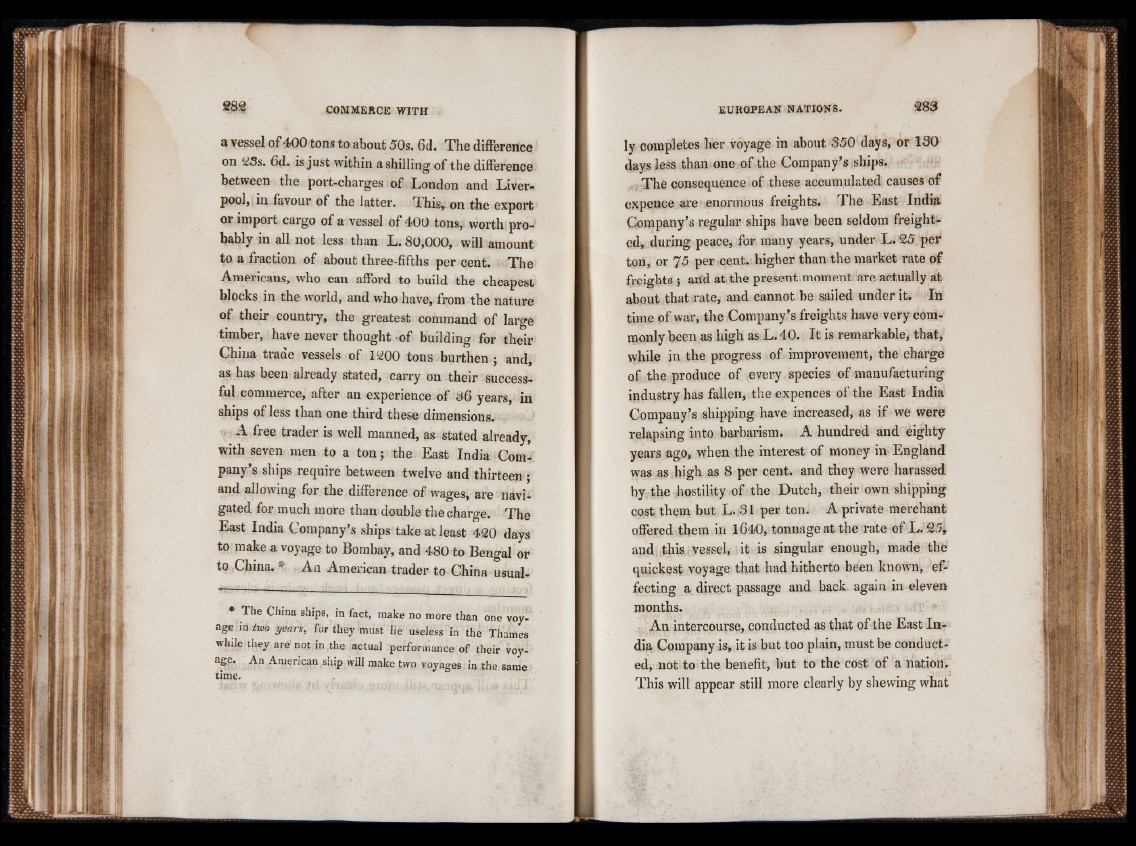
a vessel of 400 tons to about 50s. 6d. The difference
on 23s. 6d. is just within a shilling of the difference
between the port-charges of London and Liverpool,
in favour of the latter. This, on the export
or import cargo of a vessel of 400 tons, worth probably
in all not less than L. 80,000, will amount
to a fraction of about three-fifths per cent. The
Americans, who can afford to build the cheapest
blocks in the world, and who have, from the nature
of their country, the greatest command of large
timber, have never thought of building for their
China trade vessels of 1200 tons burthen ; and,
as has been already stated, carry on their successful
commerce, after an experience of 36 years, in
ships of less than one third these dimensions.
A free trader is well manned, as stated already,
with seven men to a ton; the East India Company’s
ships require between twelve and thirteen;
and allowing for the difference of wages, are navigated
for much more than double the charge. The
East India Company’s ships take at least 420 days
to make a voyage to Bombay, and 480 to Bengal or
to China. * An American trader to China usual*
The China ships, in fact, make no more than one voyage
in two years, for they must lie useless in the Thames
while they are' not in the actual performance of their voyagp.
An American ship will make two voyages in the same time.
ly completes her voyage in about 350 days, or 130
days less than one of the Company’s ships.
The consequence of these accumulated causes of
expence are enormous freights. The East India
Company’s regular ships have been seldom freighted,
during peace, for many years, under L. 25 per
ton, or 75 per cent, higher than the market rate of
freights ; and at the present moment are actually at
about that rate, and cannot be sailed under it. In
time of war, the Company’s freights have very commonly
been as high as L. 40. It is remarkable, that,
while in the progress of improvement, the charge
of the produce of every species of manufacturing
industry has fallen, the expences of the East India
Company’s shipping have increased, as if we were
relapsing into barbarism. A hundred and eighty
years ago, when the interest of money in England
was as high as 8 per cent, and they were harassed
by the hostility of the Dutch, their own shipping
cost them but L. 31 per ton. A private merchant
offered them in 1640, tonnage at the rate of L. 25-,
and this i vessel, it is singular enough, made the
quickest voyage that had hitherto been known, effecting
a direct passage and back again in eleven
months.
An intercourse, conducted as that of the East India
Company is, it is but too plain, must be conducted,
not to the benefit, but to the cost of a nation.
This will appear still more clearly by shewing what